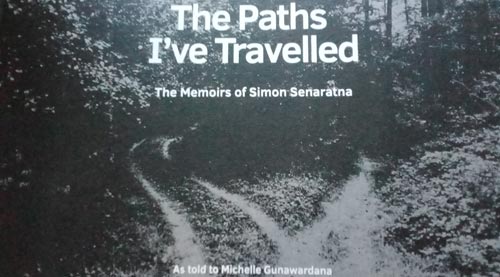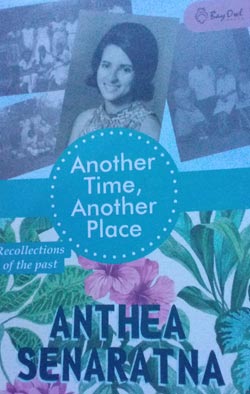Manifold experiences captured in memoirs by husband-wife duo
The Paths I’ve Travelled- by Simon Senaratna
A couple of weeks back I attended a fascinating event, the publication of two books of memoirs by a husband and his wife, Sriyantha and Anthea Senaratne. I have known them for ages, but in very different contexts, Anthea as a writer, and Simon as a lawyer, met when his firm helped the honest members of the Trinity College Board to deal with problems that had arisen there.
‘Simon’ as he, and also his law firm, are known had attended Trinity, and his love for the place illuminates his memoirs, though for good reasons he describes he did not accept an offer to take on the Principalship in the nineties. That was one of the many surprising things I gathered from what is a gripping tale. It is entitled The Paths I’ve Travelled, referring to Robert Frost’s haunting poem ‘The Road not taken’, and also to the range of experience he has amassed in his journey through life.

 I knew he was a lawyer, and that is his principal occupation now, but he also worked in the travel trade, where both at Walker Tours and then at Gemini he engaged in influential innovations. Oddly enough my life unbeknowingly crossed his nearly half a century ago, when I was asked by Chloe de Soysa, with whom he worked in both travel incarnations, to write some blurbs for the new hotel concept they had developed.
I knew he was a lawyer, and that is his principal occupation now, but he also worked in the travel trade, where both at Walker Tours and then at Gemini he engaged in influential innovations. Oddly enough my life unbeknowingly crossed his nearly half a century ago, when I was asked by Chloe de Soysa, with whom he worked in both travel incarnations, to write some blurbs for the new hotel concept they had developed.
But from the start the book is full of both interest and charm, beginning with his account of a village childhood, followed by Trinity and then his time at Peradeniya, where he pays tribute as many of his contemporaries have done to my uncle Lakshman who was chaplain there. And then, after he had started to work as a lawyer with Julius and Creasy, he describes a year in America as a Rotary Scholar, when he proved an admirable ambassador for the country.
That is followed by an account of his marriage, and his description of family life is almost lyrical. In the course of the book he notes lessons he learnt from his mentors, one from a Trinity Principal about the need to cherish a family, another from his first boss about the human dimension to the work of a lawyer. The narrative makes clear how he followed the advice he received, which is shown to have produced enormous contentment.
But there were disappointments, which he does not avoid recording, though he moves swiftly so that we are barely conscious of what must have been anguish. That indeed only comes across at length in his account of disappointment as a boy at not being put into the House he had wanted, a disappointment that he coped with though characteristically he did not hesitate to express it.
Disappointment is passed over swiftly later, though never glossed over, as when he was punished for his year of leave to go to America by a senior partner at Julius and Creasy who assigned him to an area which brought him no satisfaction, and later when at D L & F de Saram he was practically forced out, for reasons that do not bear scrutiny. But in both cases he moved on to better things, the travel trade in the first instance, and then later to his own law firm, which is housed in perhaps the most enviable of settings for legal practice, the beautiful old Galle Face Court flats.
That is where I met him, and a team of delightful youngsters he works with. That they appreciate his leadership was apparent from the pictures of the celebration they put on for his 75th birthday. Those are amongst the wealth of depictions of both high points in Simon’s life, and routine pleasures, family gatherings, holidays in exotic destinations, newspaper cuttings of high points in his career.
Simon’s good nature shines through the book, though as when he was a schoolboy he makes critical points gently but tellingly. He does this about the shabby treatment he received from his second law firm, and also about the takeover by Christopher Ondaatje of Forbes & Walker, which he assisted in, as to which he was told later by his friend Adrian Zecha of the Aman Group that ‘they are not investors, they are paper shufflers’.
But it was mainly good Simon achieved, as shown by his determination when he headed the National Council of the YMCA and was determined to visit branches in Jaffna though it was the war period when travel was difficult. But he persevered as he did in much else, and the satisfaction he brought to those who had felt isolated is typical of a man who has in his quiet way brought satisfaction to so many.
Another Time, Another Place- by Anthea Senaratna
The volume of memoirs that Anthea Senaratne launched at the same time as that of her husband Sriyantha is very different in its scope. Simon – as Sriyantha is generally known, because of his early love (as his book reveals) for Simon Templar, the Saint, Leslie Charteris’ heroic upholder of the good – describes his whole life, whereas Anthea confines herself to childhood. And while Simon moves swiftly through his manifold experiences, Anthea dwells upon hers so that the reader is made vividly aware of the emotions she underwent in the different places in which she lived.
The book is essentially in two parts, first her life outside Colombo when her father served in the Civil Service in Trincomalee and in Kurunagala, and then her experiences as a schoolgirl and a youngster earning her living in Colombo. That period concludes with her meeting with Simon, with a very short postscript describing the joy of her marriage, which Simon has fleshed out in his own book.
Another Time, Another Place is then in essence an account of the joys and the sorrows of growing up, expressed vividly, and all the more interesting because Anthea recreates a life that has now faded away. The account of the spacious homes in which Civil Servants in provincial centres lived is fascinating, and the more so for me with regard to Kurunegala, where I spent many happy holidays during the last days of that era of gracious living. Coincidentally, the Government Agents with whom her father, Mr Jansz, worked were well known to me, Tilak Gooneratne in Trincomalee and, if not Herbert Tennekoon in Kurunegala, his wife Norma– ‘a dynamic lady’, as I found myself, forty years later.
In Colombo there is a vivid account of a Burgher childhood, very different from the one Carl Muller describes, for Anthea’s background was a step higher in the social scale. Hers was a close knit family and there are vivid accounts of cousins and aunts and uncles, including those who were not blood relations but were even more intimate, including those who owned the rented accommodation in which the Jansz family lived. Amongst the characters who stand out were the maiden aunts who insisted that children wear socks and shoes at home, and the friend who collected snakes and let them loose in the verandah at Trincomalee.
Anthea’s descriptions are lively, of family Christmases, of schoolgirl japes and passions (for film stars as well as the boys they met), of her father’s whimsical sense of humour. But she also notes the latter’s strict sense of decency, which led to him categorically abolishing caste differentiation in his household at Trincomalee, where previously the different castes had had to use different entrances to the house compound. At a very different level, it was also fun to read of a world I dimly recall, of the Coconut Grove and the Jetliners, high points in entertainment in the sixties, so advanced then but now so mild in comparison with what later developed.
But she also recreates movingly the sorrows she experienced, most movingly the death of her older brother which as a little girl she could not quite take in, so that she kept hoping when they moved to Trincomalee that he would be waiting for her when they got back to Colombo. The picture of him standing protectively over Anthea which she reproduces makes clear the closeness of their relationship despite the gap in years. Fortunately she had an older sister, who was also close, a closeness which she shows burgeoning over the years.
The account of that slow death, when he could not longer play the piano at which he had excelled, and which was taken to his room so he could play on his own, is perhaps the most moving section of the book. But much later we are also taken through the death of her mother, who suffered a stroke when she was still quite young, and passed away shortly afterwards. How Anthea and her sister, now married, coped, and also with their bereaved father ‘who would lie on his bed the whole day’, is touchingly described.
Moving too is Anthea’s account of the pets she adored, especially of the dog who went with them to Trincomalee, and then had to be put down when bitten by a rabid dog. The last section about Trincomalee notes her farewell to the place, with ‘my final look at the front wall where I used to sit with my beloved Kim’. The capacity not only to recall but to recreate the emotion of that long ago loss is a hallmark of this fascinating book.
Searching for an ideal partner? Find your soul mate on Hitad.lk, Sri Lanka's favourite marriage proposals page. With Hitad.lk matrimonial advertisements you have access to thousands of ads from potential suitors who are looking for someone just like you.


